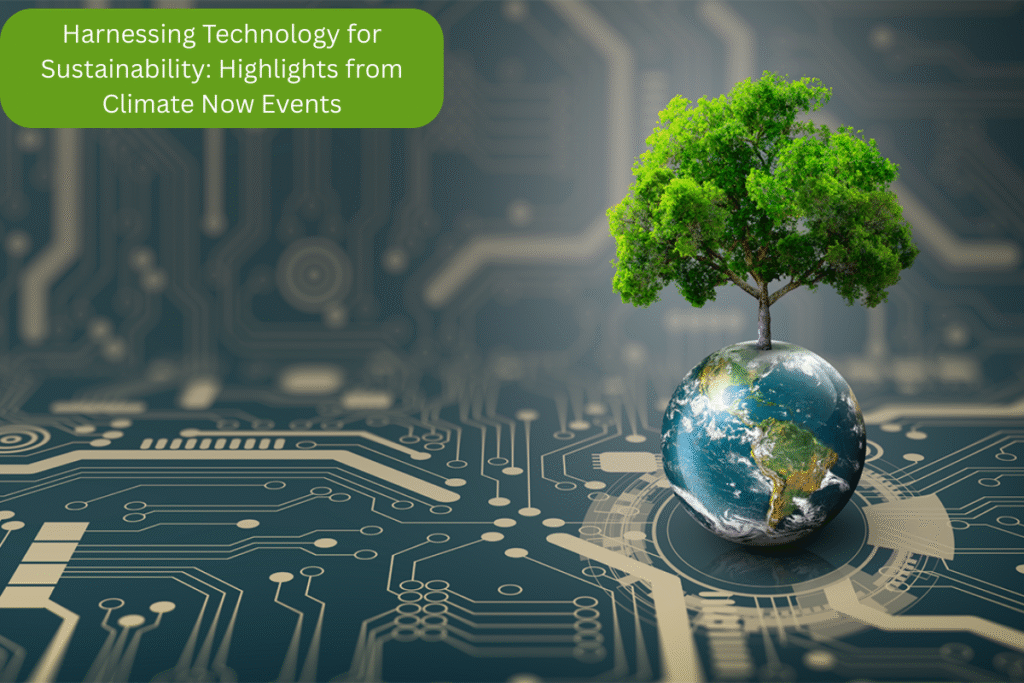
In the fight against climate change, technology is playing an increasingly vital role. From renewable energy innovations to smart city solutions and carbon capture technologies, tech advancements are accelerating the transition to a sustainable future. Climate Now Events are at the forefront of showcasing these innovations, bringing together industry leaders, researchers, and policymakers to discuss how technology can be harnessed to create a greener, more sustainable world.
In this article, we explore how Climate Now Events have highlighted the role of technology in driving sustainability, the latest innovations featured at these events, and how these technologies are shaping the future of the planet.
Why Technology is Essential for Sustainability
Technology has become the backbone of global sustainability efforts, offering scalable solutions that can be adopted by governments, businesses, and individuals. Here’s why harnessing technology is crucial for addressing climate challenges:
- Efficient Resource Management: Technology enables better use of resources like energy, water, and raw materials, reducing waste and improving efficiency.
- Innovation for Renewable Energy: Advancements in solar, wind, and hydro power technologies provide clean alternatives to fossil fuels, helping reduce greenhouse gas emissions.
- Smart Cities: IoT (Internet of Things), AI (Artificial Intelligence), and big data are making urban spaces more energy-efficient, resilient, and sustainable.
- Carbon Capture and Storage (CCS): Emerging technologies in carbon capture allow industries to trap and store carbon dioxide emissions, preventing them from entering the atmosphere.
At Climate Now Events, these and other technological innovations are discussed and showcased, providing a platform for collaboration, innovation, and solutions that drive sustainability.
Highlights from Climate Now Events: Technology for Sustainability
Climate Now Events have become key gatherings for those interested in the intersection of technology and sustainability. From cutting-edge green technologies to innovative policy frameworks, here are some of the highlights that have emerged from recent events:
1. AI for Climate Modeling and Decision-Making
Artificial Intelligence (AI) is helping to transform climate science by enabling more accurate climate modeling and improving decision-making processes. At Climate Now Events, experts discussed how AI can predict climate impacts, optimize energy use, and improve the efficiency of renewable energy systems.
- Real-time Climate Monitoring: AI models can analyze vast amounts of climate data in real-time, providing early warning systems for extreme weather events like floods and hurricanes.
- Energy Efficiency: AI algorithms are used to optimize energy consumption in buildings, industrial processes, and transportation systems, contributing to a reduction in energy waste.
2. Blockchain for Transparency in Sustainability
Blockchain technology is increasingly being used to promote transparency and accountability in sustainability efforts. At recent Climate Now Events, speakers highlighted how blockchain is being utilized in carbon trading, supply chain transparency, and renewable energy transactions.
- Carbon Credits: Blockchain enables the creation of secure, verifiable carbon credit systems, ensuring that emissions reductions are tracked and verified.
- Supply Chain Transparency: Blockchain’s immutable ledger allows companies to track and verify the sustainability of materials, ensuring products are sourced responsibly.
3. Green Tech Innovations in Renewable Energy
The renewable energy sector has seen major advancements in solar power, wind energy, and battery storage technologies. Climate Now Events showcased the latest breakthroughs, including:
- Perovskite Solar Cells: A new generation of solar cells that offer higher efficiency at a lower cost, enabling the widespread adoption of solar energy.
- Floating Wind Turbines: These turbines open up new areas for offshore wind energy generation, allowing for energy production in deeper waters.
- Energy Storage Solutions: Advanced battery technologies are making it possible to store excess energy produced by renewable sources, ensuring a consistent energy supply even when production fluctuates.
4. Smart Cities and Sustainable Urban Development
With urbanization on the rise, creating sustainable cities is essential for the future of the planet. Climate Now Events have highlighted several technological solutions aimed at making cities more sustainable, including:
- Smart Grids: These energy systems use real-time data to balance energy demand and supply, reducing waste and improving efficiency.
- Electric Mobility Solutions: Electric vehicles (EVs), bike-sharing systems, and smart public transport are key components of sustainable urban mobility.
- Green Building Technologies: Energy-efficient buildings equipped with smart sensors and renewable energy sources are becoming the standard in urban planning.
5. Carbon Capture and Storage (CCS)
One of the most promising technological solutions for addressing climate change is carbon capture and storage (CCS). At Climate Now Events, industry experts discussed the latest CCS developments, including:
- Direct Air Capture (DAC): A technology that extracts carbon dioxide directly from the atmosphere and stores it underground or repurposes it for industrial use.
- Enhanced Oil Recovery (EOR): CCS is also being used in the oil industry to inject CO2 into oil fields to increase oil extraction, while simultaneously storing carbon underground.
FAQs About Harnessing Technology for Sustainability
1. What role does technology play in achieving sustainability goals?
Technology is essential in driving renewable energy, smart cities, and resource efficiency. It enables more accurate climate modeling, better decision-making, and innovative solutions that reduce environmental impact.
2. How does AI contribute to sustainability efforts?
AI enhances sustainability efforts by improving energy efficiency, enabling real-time climate monitoring, and optimizing processes such as renewable energy production and resource management.
3. What is the significance of blockchain in sustainability?
Blockchain ensures transparency and accountability in sustainability by tracking carbon credits, verifying supply chain sustainability, and enabling efficient energy transactions.
4. What are the latest innovations in renewable energy?
Recent innovations include perovskite solar cells, floating wind turbines, and advanced battery storage technologies, all of which make renewable energy more efficient and accessible.
5. How does carbon capture technology help in fighting climate change?
Carbon capture technologies, such as direct air capture and enhanced oil recovery, trap CO2 emissions and store them underground, preventing them from entering the atmosphere and contributing to climate change.
Conclusion
Harnessing technology for sustainability is one of the most effective ways to tackle the climate crisis. As Climate Now Events continue to showcase cutting-edge innovations and solutions, they provide the global community with the tools and knowledge needed to create a greener, more sustainable future. By integrating renewable energy, AI, blockchain, and carbon capture technologies, we can make significant strides toward achieving global sustainability goals and ensuring a healthier planet for future generations.
